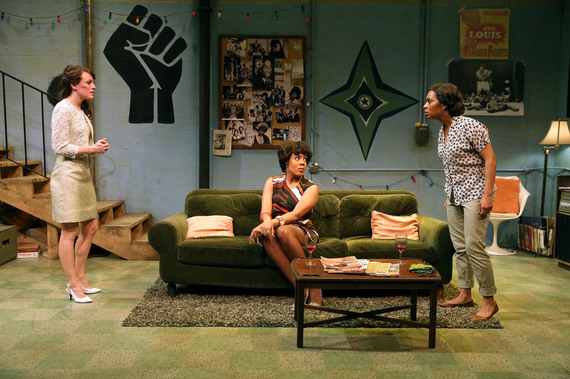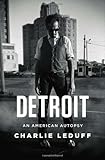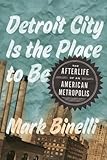
Michigan Gov. Rick Snyder, a white Republican, announced on March 1 that the state will appoint an emergency manager to try to bring the city of Detroit, largely black, largely Democrat, and nearly broke, back from the brink of financial ruin. The night before Snyder made that racially and politically fraught announcement, as it happens, I went to the Public Theater in New York to see the world premiere of a new work by a young Detroit playwright named Dominique Morisseau. The play, Detroit ’67, is set during the city’s bloody riot in the summer of 1967, and, like Snyder’s announcement, it is a reminder that the past will always be with us. Morisseau’s play could not be more timely.
 It’s set in the basement of a West Side apartment shared by two siblings, the straight-arrow Chelle (Michelle Wilson) and her ambitious brother Lank (Francois Battiste), who have just received a small inheritance following their parents’ deaths. They’ve agreed to turn the basement into an after-hours nightclub, but it’s their sharply differing dreams for a better future that will drive brother and sister apart. Caught in the crossfire are their friends Bunny (De’adre Aziza) and Sly (Brandon J. Dirden). When Lank and Sly find a battered, disoriented white woman named Caroline (Samantha Soule) wandering on the street, they bring her to the basement to recuperate. The fireworks begin.
It’s set in the basement of a West Side apartment shared by two siblings, the straight-arrow Chelle (Michelle Wilson) and her ambitious brother Lank (Francois Battiste), who have just received a small inheritance following their parents’ deaths. They’ve agreed to turn the basement into an after-hours nightclub, but it’s their sharply differing dreams for a better future that will drive brother and sister apart. Caught in the crossfire are their friends Bunny (De’adre Aziza) and Sly (Brandon J. Dirden). When Lank and Sly find a battered, disoriented white woman named Caroline (Samantha Soule) wandering on the street, they bring her to the basement to recuperate. The fireworks begin.
This taut drama, crisply directed by Kwame Kwei-Armah, beautifully acted, produced in association with the Classical Theatre of Harlem and the National Black Theatre, doesn’t have to stretch to make us see it as a metaphor for the racial tensions that are about to engulf the city of Detroit and much of the rest of America. It is one of Morisseau’s gifts to be able to make the personal universal, plausibly, heart-breakingly so. Another of her gifts is the ability to see that Detroit is a city burdened with misconceptions. Among the most stubborn, as Detroit ’67 states with a wicked punch, is the myth that the ’67 riot — or “the Great Rebellion,” as many Detroiters call it — was the root cause of the city’s decline. It was not. Detroit’s population peaked at 1.8 million in 1950 and then began declining as new highways greased the exodus to the suburbs. Meanwhile, the Big Three automakers started sending factory jobs to non-union states, a damaging trend that became ruinous with the advent of globalization. Today, the city’s population is about one-third what it was at its peak. As Morisseau’s play makes clear, the ’67 riot was just one symptom — and an unwelcome accelerant– of a decline that had been in motion for nearly two decades.
“I wanted to contribute a different Detroit narrative,” Morisseau told me at the Public Theater the day before I saw the play. “I want to write as I believe we are. A human being has many flaws. I’m writing from a place of love rather than a place of judgment. I have to show who we are, our humanity. We’re more than sound bites.”
Morisseau graduated from Cass Tech High School, alma mater of Diana Ross, John DeLorean, Lily Tomlin, and scores of famous Detroiters. After studying acting at the University of Michigan, Morisseau came to New York to pursue her career in the theater. Detroit ’67, developed while she was part of the Public Theater’s Emerging Writers Group, is laced with telling historical detail. I know much of the history because I grew up in Detroit and was a teenager during the riots, and later I spent years researching a novel set during the era. Morisseau, who was not born until 1978, knows the history thanks to family stories she heard while growing up, and to a newspaper clipping file kept by an uncle who worked as a freelance journalist.
“Then I started reading the work of Pearl Cleage,” Morisseau said, referring to the playwright, novelist and essayist whose father, Rev. Albert Cleage, was a prominent civil rights activist in Detroit in the 1960s and 1970s, an outspoken advocate of the Black Power movement. “That reading led me to the plays of August Wilson. I felt his overwhelming sense of pride in Pittsburgh and what the people of Pittsburgh must feel. I love writing about Detroit, and I thought I should do a three-cycle play about my hometown. I knew the riot era had to be covered.”
Morisseau has nearly completed her three-play cycle. Paradise Blue is set in the post-World War II jazz clubs of Paradise Valley, the thriving heart of Detroit’s black East Side that was bulldozed to make way for the Chrysler Freeway, an undying insult to many black Detroiters of a certain age. Skeleton Crew is set in 2008, as the recession was hitting, Chrysler and General Motors were sliding into bankruptcy, and many people had given Detroit up for dead.
As she was writing Detroit ’67, Morisseau never lost sight of the fact that she’s a dramatist, not an historian. “This play is not necessarily a history lesson,” she says in a note that appears in the program. “However creative I am choosing to be, I am not being unfaithful to the spirit of the city or the outrage that ignited the riots. The truth is, there were police units called the Big Four that would ride around the city and harass the black residents, particularly around Twelfth Street. The truth is, Twelfth Street was considered to be a ‘seedy’ part of town. The truth is, the riots began in this very neighborhood at a time when police brutality had run far too rampant and an after-hours joint (also called a ‘blind pig’) located above a printing shop got raided. The truth is, the city’s disenfranchised were becoming social rebels.”
True on every count. These truths come to life in what was, for me, the most poignant moment of Detroit ’67, which will run at the Public Theater through March 17, then move uptown to the National Black Theatre of Harlem from March 19 to April 14. Caroline, the battered white woman, has made herself useful in the basement after-hours club during her convalescence, helping make the business a success. But she has also run afoul of Chelle, who disapproves of the growing attraction between her brother and this white intruder, with her dark past and her taste for Bali Hai wine and Motown music. As flames flicker in the windows and Army tanks rumble past on the street, the two women spar over the racial divide, the seemingly unbridgeable chasm that is as old as America itself, the gulf that keeps us all, regardless of our skin color, from being fully alive and truly free:
CHELLE: You and Lank can pretend to be cut from the same cloth all you want. But outside this basement tell a different story. Lank got his eye on the sky but Detroit ain’t in the sky. It’s right here on the ground. A ground with a lot of dividing lines. We on one side and you on the other.
CAROLINE: And what about when the lines are blurred? When you feel something that can’t be cut up or divided? When you know you belong somewhere even if people tell you you’re not allowed. That’s where we meet, Lank and me. Somewhere without all the zones and restrictions. Some place that doesn’t care if we dance close and enjoy the same music. Some place where we’re not stuck. And maybe that’s in a place you refuse to go…maybe you’re afraid what’ll happen if you do…but that’s the place where someone like Lank and someone like me are exactly the same. And if you don’t see that, maybe you’re the one with the blind spot!
CHELLE: I’m the one with the blind spot? You can run out of here right now. Leave town with these cops chasing you. They can harass you and bruise you and even try to kill you. That may make you the same as us. But if you survive it, you can leave. You can disappear and reappear wherever else you want, in any zone you choose. Live a new life without permission or boundaries or some kinda limits to your skin. Can Lank do that? Can any of us? Everywhere we go, the lines is real clear. Ain’t nothin’ blurred about it. You might dream the same. You might listen to the same music. You might even feel the same heartbreak. But til’ he have the same title to this world that you got, you and him ain’t gon’ never be the same! And that ain’t blindness tell me that. That’s 20/20.
Much has been written lately (some of it by me) about the hopeful signs of rebirth in Detroit — a newly bustling downtown, the rise of a young entrepreneurial class, the sprouting of urban farms, the city’s irrepressible work ethic, even the stunning rebound of the auto industry. These developments are real, and they’re worth celebrating. But as Gov. Snyder’s announcement reminds us, the city’s problems are entrenched, and they won’t be fixed by eager entrepreneurs, hipsters, or good press. The city is in desperate need of three things: jobs, people, and the tax revenue that comes with them.


 But at least the city’s problems — and the historical sources of those problems — are being addressed in a clear-eyed fashion by a new generation of writers who are able to see beyond the tired cliches, beyond ruin porn and rosy optimism, beyond the finger-pointing and the exhausted racial-political rhetoric. With Detroit ’67, Dominique Morisseau has added her voice to this robust chorus. Its members include Mark Binelli, author of Detroit City Is the Place To Be: The Afterlife of an American Metropolis. And Charlie LeDuff, author of the current New York Times bestseller Detroit: An American Autopsy. And Paul Clemens, author of Punching Out and Made in Detroit.
But at least the city’s problems — and the historical sources of those problems — are being addressed in a clear-eyed fashion by a new generation of writers who are able to see beyond the tired cliches, beyond ruin porn and rosy optimism, beyond the finger-pointing and the exhausted racial-political rhetoric. With Detroit ’67, Dominique Morisseau has added her voice to this robust chorus. Its members include Mark Binelli, author of Detroit City Is the Place To Be: The Afterlife of an American Metropolis. And Charlie LeDuff, author of the current New York Times bestseller Detroit: An American Autopsy. And Paul Clemens, author of Punching Out and Made in Detroit.
None of these writers buys the simplistic old myths — that the riot single-handedly ruined Detroit; that the city’s first black mayor, fiery Coleman Young, was either a devil or a saint; that the racial divide can be bridged with good intentions; that the auto industry’s soaring profits will be the city’s salvation.
The truth is much more complicated than any of that. Dominique Morisseau is a young talent worth watching because she’s seeing our troubled, fascinating, resilient hometown with vision that’s 20/20.
Image courtesy of The Public Theater.








